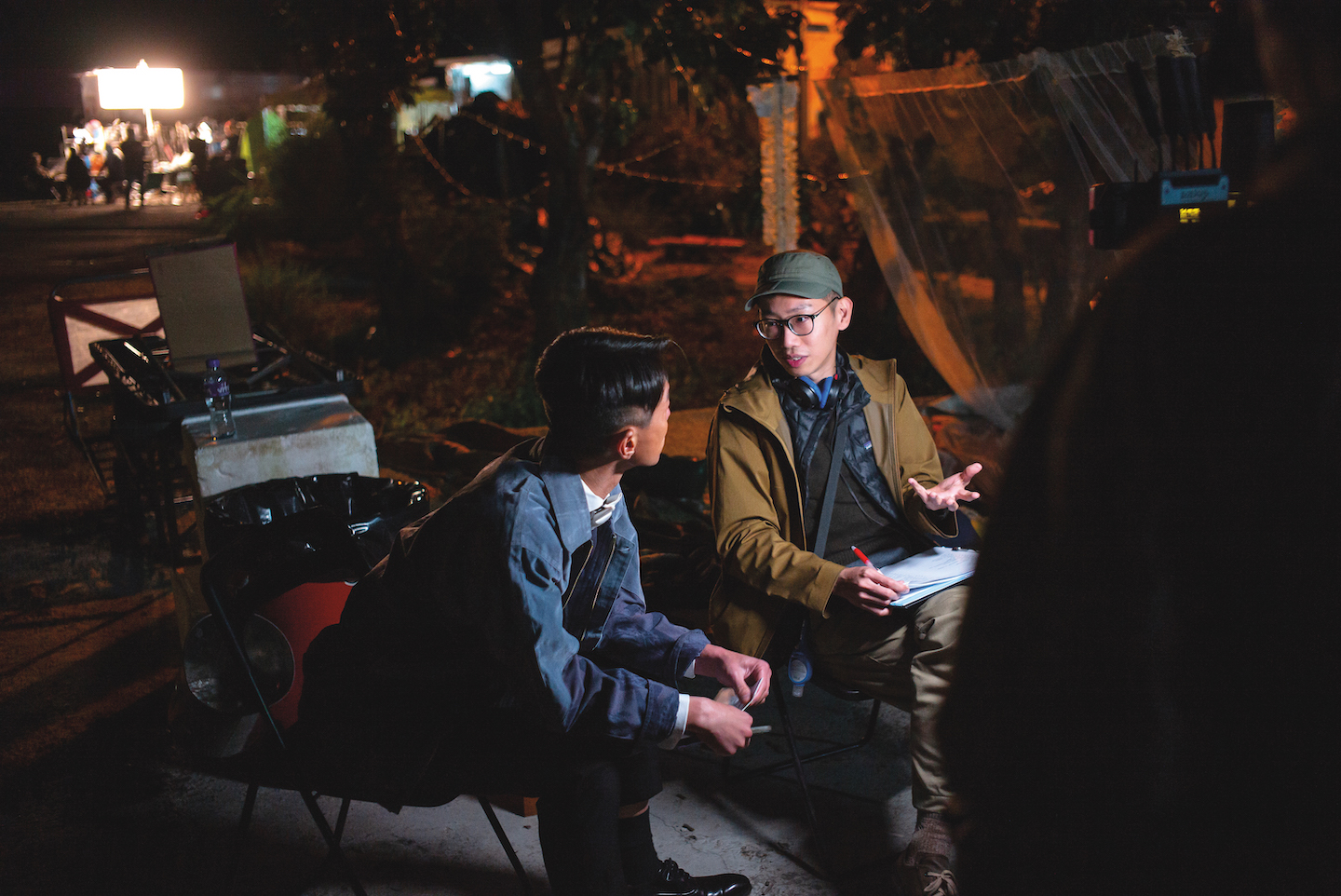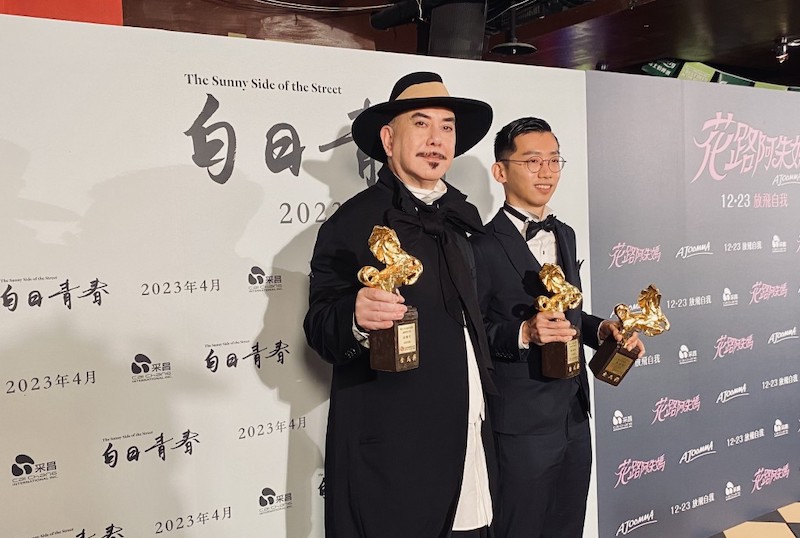
Hong Kong-based Malaysian filmmaker Lau Kok Rui stepped up to the podium twice at the 59th edition of what is reputedly the Oscars of Chinese-language cinema (All photos: Lau Kok Rui/The Sunny Side of the Street)
A happy surprise and an overwhelming win bookend The Sunny Side of the Street at this year’s Golden Horse Awards held in Taipei last month. Hong Kong-based Malaysian filmmaker Lau Kok Rui stepped up to the podium twice at the 59th edition of what is reputedly the Oscars of Chinese-language cinema. He was named best new director and his script for the film picked up the best original script prize.
Lau’s debut feature scored a hattrick: Veteran Hong Kong star Anthony Wong, as a taxi driver who helps a Pakistani boy, received the best actor award. Eleven-year-old Sahal Zaman, who portrays young Hassan, was nominated for best new performer.
Speaking via Zoom from Hong Kong, where he first arrived to study 14 years ago, Lau, 32, says he is overwhelmed because he never thought his story about refugees’ experience in the Special Administrative Region of China would make it from real-life observations into a reel.
“It’s not a very interesting topic for Hong Kong film investors. Most of the characters are South Asians,” he explains.
The subject may not be topical to the locals, but as an outsider who has learnt to find his way in the city, Lau notices the problems, uncertainties and pressures faced by many people who head to Hong Kong to work or find a new home. He empathises with them.
ci_new_pic.jpg

“Maybe it’s about how I see people. In Malaysia, we have different cultural backgrounds and ethnicities. It’s natural for us to embrace people from different backgrounds. We never see that as a problem in daily life, until it comes to political disputes.
“Here, the Chinese are the majority and it’s difficult for locals to embrace those from different cultural backgrounds. Not many Hong Kong directors will [focus on] these foreigners. I see myself as part of the minority even though I’m Chinese. So, I write about them and speak for them.
“I touch on social issues, like migrant mothers. If a domestic helper wants to give birth in Hong Kong, the child will not have citizenship here. Refugees may not have money or the ability to take care of their newborns. So the question arises: Should I give my child up for adoption?”
The film reflects Lau’s personal life, too, especially the years after he first enrolled at City University at 18. “I lived on my own and had lots of emotions. I put a lot of myself and my experience in the film industry into the movie.”
The Sunny Side of the Street centres on grumpy Yat, who befriends Hassan and tries to help him escape the police, which has cracked down on the gang the boy is staying with. Having lost his father in an accident and forced to fend for himself, Hassan quickly forms a bond with the 60-year-old taxi driver.
Identity and belonging are themes Lau is drawn to. His first short film — romance story Let’s Get Lost — hinges on that. His second is about an immigrant family in Hong Kong. Even Yat is an émigré himself. He fled mainland China 40 years ago by swimming across the sea to safety.
“Most of the younger people in Hong Kong, those of my generation, are born and educated here,” Lau continues. “After Hong Kong was handed back to China, some people expected a Chinese regime. How the locals see themselves is a complicated issue.
golden_horse.jpeg

“I want to present a bigger picture of Hong Kong. This city is actually one with so many foreigners,” adds Johor-born Lau, who is grateful that Singapore-registered Petra Films, which has operations in Hong Kong and other parts of the world, picked up his feature effort, a dramatic story about immigrant life and relationships and one night in the lives of its two protagonists.
The business administration graduate gave himself a year to explore what he wanted to do after university. “I joined lots of film-making workshops and found myself in love with that. I decided to become a filmmaker.”
He found work at a production company doing TV commercials. At the same time, he started making documentaries with a group of friends. After a couple of short films, he sat down to write The Sunny Side of the Street. He then joined film laboratories in Hong Kong and Taiwan, and got to know script consultants who helped fine-tune what he had written.
Casting Hassan was an interesting experience for Lau, who visited schools, community centres and non-governmental organisations to look at possible candidates.
“Luckily, I found Sahal. He is very funny and not afraid of talking to adults. Most of the kids I met were nervous about that. Sahal was never afraid of giving us something. I had one month of drama training with him to prepare him for what happens during a shoot.”
Pakistan-born Sahal’s family had moved to Hong Kong about six years ago and are now residents. In the show, he speaks Urdu and Cantonese. A Pakistani cricket coach had stepped in as assistant director, giving directions to cast members from his country and ensuring that the dialogue was right.
It was hard casting suitable people from the community for various roles, Lau recalls. “It was all about trial and error, as most of them had no experience in filmmaking. We got them in and equipped them with techniques and skills. It was a long journey.”
He is also thankful to the producers, crew and cast, who were generous in giving him a hand. “About 60% of The Sunny Side of the Street was shot at night, making things more difficult in terms of production. I think it’s very important for a new director to be open. You have to work with the right people who can help you.
“Being a director is not only about making creative decisions. Sometimes, it’s also about interpersonal relationships, communications and admin work.”
It is also about finding money to transfer his ideas onto film. He did not think he could find anyone to invest in his script because its subject would not attract Hong Kong producers. “I was also very inexperienced.” Happily, he did, and production started in November last year. The Sunny Side of the Street, which has yet to be released, was then entered for the 2022 Golden Horse Awards.
“Our investors love the story. We have the same ambition — to make movies that are meaningful and beautiful. They never put any pressure on me to make this a money-making [venture]. They respected me and gave me lots of creative freedom. It was a very good production experience.”
Lau’s film takes its title from an old jazz standard, On the Sunny Side of the Street. Before starting on a script, he would go out to search for something to ease him into the mood or tone of whatever he was working on.
“I usually read poems or listen to songs to get that something. It’s not necessarily about the story, just the tone, or something I want to express.” In this instance, what he has to say is: “There is always a darker side, even to a sunny street. And that’s the community we don’t focus on in Hong Kong.”
Lau hopes that bringing immigrants’ dilemmas to the screen will encourage people to spare some thought for what they have to cope with in a foreign land.
This article first appeared on Dec 12, 2022 in The Edge Malaysia.


